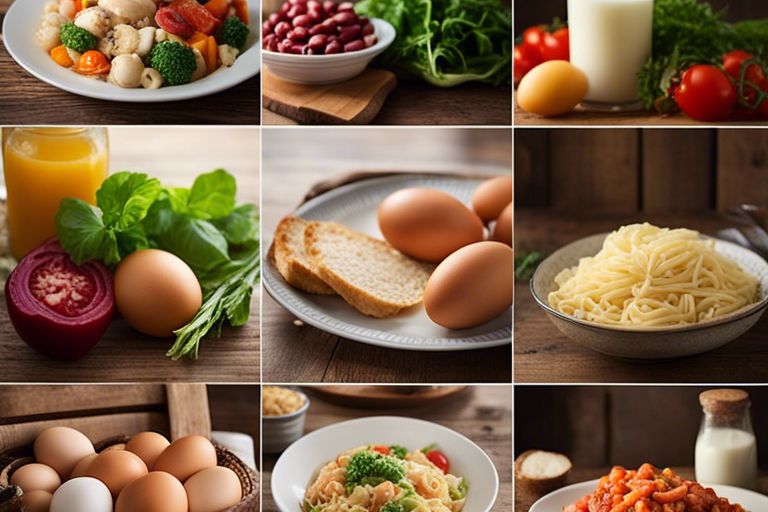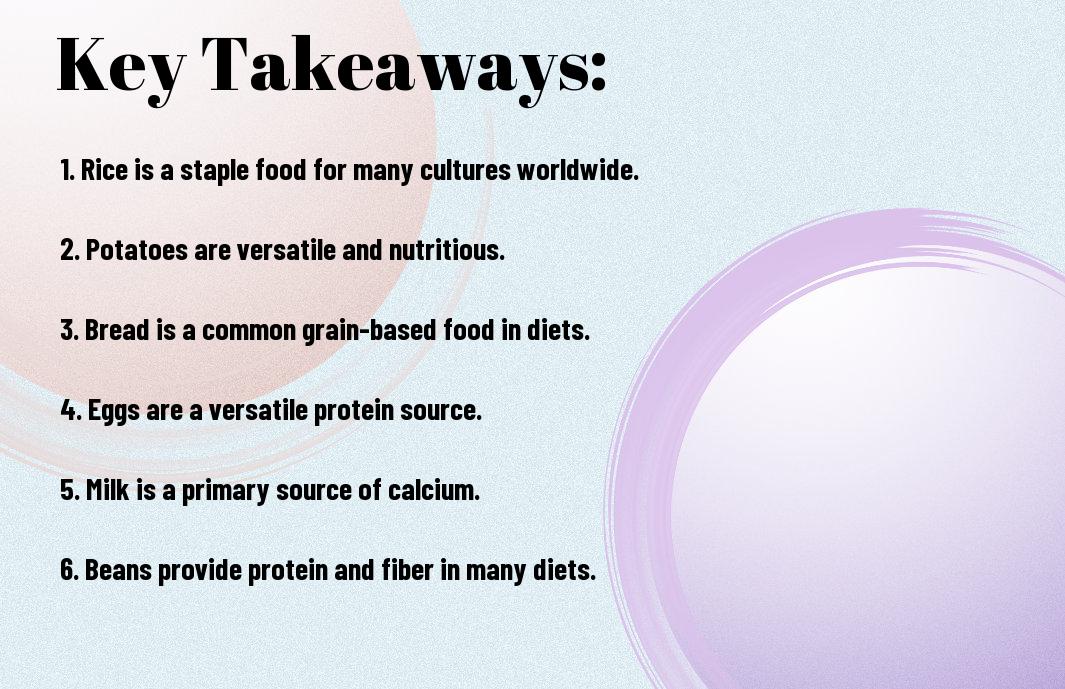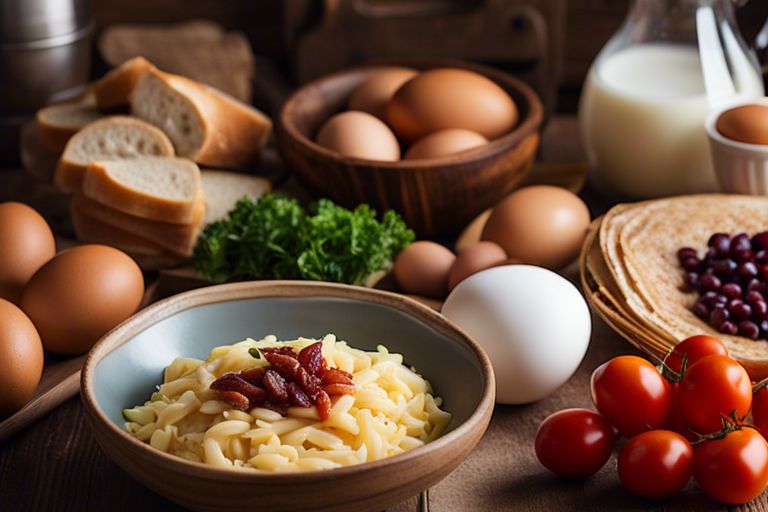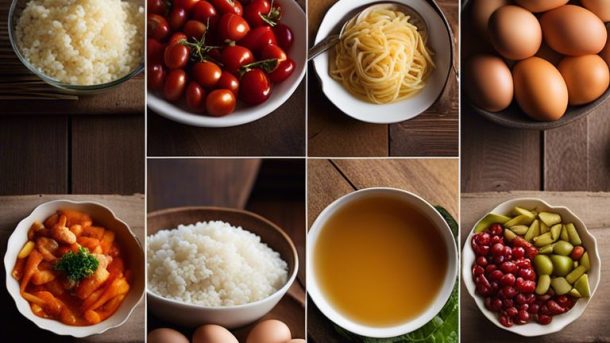Just like a well-stocked pantry, your diet should have its imperatives. In this blog post, we will explore the 10 most basic foods that should be a part of your regular meals. Inspired by Michael Pollan’s philosophy of simplicity in food choices, we will break down these foundational ingredients that can nourish your body and keep you healthy. So, let’s dive in and discover the key staples that should have a place in your kitchen!
Key Takeaways:
- Whole Grains: Whole grains such as brown rice, quinoa, and oats are important for a well-balanced diet.
- Fruits and Vegetables: These provide important vitamins, minerals, and fiber for overall good health.
- Lean Proteins: Foods like chicken, fish, and legumes are important sources of protein for building and repairing tissues in the body.

Defining Basic Foods
The
What makes a food basic?
food is considered basic when it is unprocessed or minimally processed, providing important nutrients in their purest form. Basic foods are often whole foods that are rich in vitamins, minerals, and other important compounds that support optimal health. These foods are typically plant-based, including fruits, vegetables, whole grains, nuts, seeds, and legumes.
The
importance of simplicity in nutrition
For your overall health and well-being, it is important to incorporate basic foods into your diet regularly. These foods are nutrient-dense, providing a wide range of important nutrients that your body needs to function properly. By focusing on simple, whole foods, you can ensure that you are getting the necessary vitamins, minerals, and antioxidants to support your health.
Plus, basic foods are often more affordable and sustainable than highly processed foods. By choosing basic foods, you can support your health while also supporting the environment and local farmers. Simplifying your diet and emphasizing basic foods can lead to improved health outcomes and a greater sense of well-being.


Grains
Some of the most basic foods that form the foundation of diets around the world are grains. Grains are versatile, nutritious, and provide vital carbohydrates for energy. They come in many forms, from rice to wheat to corn, and can be prepared in numerous ways.
Rice: the staple of many cultures
For centuries, rice has been a staple food for many cultures across the globe. Whether it’s white rice, brown rice, jasmine rice, or sushi rice, this grain is a versatile and vital ingredient in countless dishes. Rice provides a rich source of energy and can be paired with vegetables, proteins, and sauces to create satisfying meals.
Bread: a fundamental food across the globe
An vital food in many cultures, bread is a staple that has been consumed for centuries. Whether it’s a crusty baguette, a soft pita, or a hearty whole grain loaf, bread comes in various forms and flavors. It can be enjoyed on its own, toasted with butter, or used as a base for sandwiches and dips.
For instance, in Mediterranean countries, bread is often served with olive oil and herbs as a pre-dinner appetizer. In France, a freshly baked baguette is a symbol of tradition and community, enjoyed by people of all ages.
Pasta: a simple yet satisfying option
Bread
Plus, pasta is a versatile and filling option that can be dressed up with various sauces and ingredients to create diverse dishes. Whether it’s spaghetti, penne, or lasagna, pasta is a beloved food that is quick to cook and easy to customize to your taste preferences.
Protein Sources
Unlike carbohydrates and fats, proteins are crucial macronutrients necessary for building and repairing tissues in your body. Including a variety of protein sources in your diet ensures that you meet your body’s protein needs. Here are some basic protein sources to consider:
Chicken: a lean and versatile protein
For a lean and versatile protein option, chicken is a classic choice. Whether you prefer grilled, baked, or roasted chicken, it can be easily incorporated into a wide range of dishes. By removing the skin, you can reduce the fat content, making it a lean protein source to support your body’s muscle development and repair.
Eggs: a convenient and nutritious staple
For a convenient and nutritious protein source, look no further than eggs. Eggs are not only affordable and widely available but also packed with crucial nutrients like vitamins, minerals, and antioxidants. Whether you enjoy them scrambled, poached, or hard-boiled, eggs are a versatile ingredient that can be included in your breakfast, lunch, or dinner.
Eggs are considered a complete protein source, meaning they contain all nine crucial amino acids that your body needs but cannot produce on its own. Including eggs in your diet can help you meet your protein requirements while supporting your overall health and well-being.
Beans: a plant-based protein powerhouse
Protein-rich and full of fiber, beans are a plant-based protein powerhouse that can be a great addition to your meals. Whether you choose black beans, chickpeas, lentils, or kidney beans, these legumes are not only budget-friendly but also versatile in various dishes like soups, salads, and stews.
Staple in many cuisines around the world, beans are not only a great source of protein but also contain important nutrients like iron, magnesium, and potassium. Adding beans to your diet can help you diversify your protein sources while reaping the many health benefits that these legumes offer.
Dairy and Alternatives
All dairy products are packed with important nutrients that are vital for your overall health. From calcium for strong bones to protein for muscle growth and repair, dairy and its alternatives are a cornerstone of a balanced diet. Here are some basic dairy products that you should consider incorporating into your daily meals:
Milk: a basic building block of nutrition
With its high calcium content, milk is considered a basic building block of nutrition. Whether you prefer cow’s milk, almond milk, or soy milk, each variety offers a unique set of benefits. Dairy milk is rich in calcium, vitamin D, and protein, while plant-based alternatives are fortified with similar nutrients to promote bone health and support your daily nutritional needs.
Cheese: a delicious and versatile dairy product
Dairy lovers rejoice – cheese is a delicious and versatile dairy product that can elevate any dish. Whether you enjoy a sharp cheddar on your sandwich or a creamy brie on your crackers, cheese adds a rich and savory flavor to your meals. Plus, cheese is a good source of calcium and protein, making it a satisfying and nutritious addition to your diet.
When choosing cheese, opt for varieties that are lower in saturated fat and sodium to maintain a heart-healthy diet. Additionally, include cheese in moderation as part of a balanced meal plan to enjoy its unique taste and nutritional benefits.
Yogurt: a healthy and convenient snack
One of the most convenient and nutritious dairy products is yogurt. Packed with probiotics, which are beneficial bacteria that support gut health, yogurt is a great snack option for those looking to improve their digestion. Additionally, yogurt is a good source of calcium and protein, making it a satisfying and filling choice for any time of day.
Building a habit of including yogurt in your daily diet can help you maintain a healthy gut microbiome, support your immune system, and provide you with important nutrients for overall well-being. Whether you prefer plain yogurt with fresh fruit or flavored varieties, yogurt is a versatile and nutritious addition to your diet.
Fruits and Vegetables
Not only are fruits and vegetables important for a balanced diet, but they also provide a variety of vitamins, minerals, and antioxidants that are crucial for your overall health. Including a colorful array of fruits and vegetables in your daily meals can help boost your immune system, improve digestion, and support your body’s overall well-being.
Apples: a crunchy and nutritious snack
Crunchy apples are not only delicious but also a great source of fiber and Vitamin C. They make for a convenient and satisfying snack that you can easily grab on the go. Whether you enjoy them whole or sliced with nut butter, apples can help curb your hunger and provide a natural energy boost.
Carrots: a simple yet healthy addition to any meal
For a simple yet healthy addition to any meal, look no further than carrots. These vibrant root vegetables are packed with beta carotene, which is important for eye health, and fiber, which supports digestive health. You can enjoy carrots raw as a crunchy snack, roasted as a side dish, or grated into salads for added color and flavor.
Apart from their nutritional benefits, carrots are incredibly versatile in the kitchen. You can use them in soups, stews, stir-fries, and even baked goods to add a natural sweetness and boost the nutritional content of your favorite dishes.
Onions: a flavorful and versatile ingredient
Healthy and aromatic, onions are a staple ingredient in many cuisines around the world. They add depth of flavor to savory dishes and can be caramelized, sautéed, or pickled to create a variety of unique tastes and textures. Onions are rich in antioxidants and sulfur compounds, which have anti-inflammatory and immune-boosting properties.
Another great thing about onions is that they are budget-friendly and have a long shelf life, making them a practical choice for cooking in bulk or meal prepping. Whether you’re adding them to a hearty stew, a fresh salad, or a sandwich, onions can enhance the taste of your dishes and take your culinary skills to the next level.
Pantry Staples
Salt: an crucial seasoning for any dish
Essential to any kitchen, salt is a fundamental pantry staple that brings out the flavors in your dishes. It is not just about enhancing taste; salt also plays a crucial role in food preservation. From seasoning meats to balancing flavors in soups and stews, salt is a versatile ingredient that should always have a home in your pantry.
Sugar: a sweet and versatile ingredient
Pantry staple sugar adds sweetness and depth to a variety of dishes, both sweet and savory. From baking cookies and cakes to caramelizing onions for savory dishes, sugar is a versatile ingredient that can elevate your cooking. Whether you prefer white granulated sugar or opt for alternatives like honey or maple syrup, having a sweetener in your pantry is crucial for creating a well-rounded meal.
When cooking savory dishes, a hint of sweetness can balance out flavors and round off the dish, creating a symphony of tastes that keep you coming back for more.
Olive oil: a healthy and flavorful cooking staple
Olive oil, a key ingredient in Mediterranean cuisine, is a healthy fat that adds a distinct flavor to your dishes. Whether drizzling it over salads, sautéing vegetables, or using it as a base for marinades, olive oil is a versatile pantry staple that can elevate the taste of your meals. Additionally, olive oil is rich in monounsaturated fats, which are heart-healthy and contribute to a well-rounded diet.
Next time you reach for the vegetable oil, consider using olive oil instead to bring a depth of flavor and health benefits to your dish.
To wrap up
From above, it is evident that incorporating the 10 most basic foods into your diet can provide a wide range of necessary nutrients needed for optimal health and well-being. By including items such as rice, beans, fruits, and vegetables in your daily meals, you can ensure that you are nourishing your body with the building blocks it needs to thrive. Note, simplicity in food choices can often lead to a more balanced and wholesome diet.
So next time you’re planning your meals, consider reaching for these basic foods to create a foundation of nutrition that will support your overall health. By focusing on whole, natural ingredients, you can take a step towards a healthier lifestyle and enjoy the benefits of a diet rich in necessary nutrients. Note, the key to good health often lies in the simplicity of your food choices.
Q: What are considered the 10 most basic foods?
A: The 10 most basic foods are often considered to be rice, bread, potatoes, eggs, milk, bananas, chicken, broccoli, beans, and tomatoes.
Q: Why are these foods considered basic?
A: These foods are considered basic because they are commonly found in diets worldwide, provide imperative nutrients, and can be used as staple ingredients in a wide variety of dishes.
Q: How can I incorporate these basic foods into my diet?
A: You can easily incorporate these basic foods into your diet by meal planning, trying out new recipes, and experimenting with different cooking methods to keep your meals interesting and nutritious.
